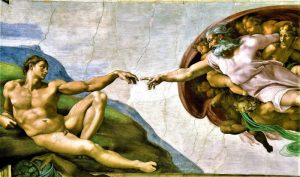Theism
Theism is the belief in the existence of one or more divinities or gods that exist within the universe and nevertheless, surpass or are independent of physical existence. These gods also interact in some way with the universe and are often considered omniscient, omnipotent, and omnipresent.
Theism incorporates monotheism, polytheism and deism, as well as pantheism, panetism which is the belief that God is everywhere in the universe, but even greater and superior to the universe and many other variants. What it does not include is atheism or the belief that there are no gods and agnosticism or the belief that it is unknown whether gods exist or not.
About theism
Theism is the recognition of God’s existence who was the creator of the universe and who participates in its conservation. Theism is not a religion in itself because it is not a system of customs or rituals, nor does it have priests or an institution. Theism functions only as a name to classify the opinion according to which god exists or there are gods. So, we can divide theism into monotheism or belief in one God, polytheism or belief in several gods, and henotheism as the belief in several gods, but with a being that is supreme to all.
Characteristics of theism
The main characteristics of theism are the following:
- Theism believes in a divinity as an active agent in the process of creation.
- It transcends the visible and the material.
- It places God as the motor and the cause of all that exists.
- It is based on medieval philosophy through authors such as Thomas Aquinas and St. Augustine.
- For believers, God is the only creator of the universe.
- God’s influence on creation is constant because divinity is responsible for life.
Origin
The word theism is a word that derives from the Greek. From the noun theos “”, which can be translated as “God” and from the suffix “-ism“, which is equivalent to “doctrine” or “thought”, for this reason it is known as the doctrine of God. It was born in Ancient Greece related to the belief in the divinities that were part of Olympus. Eventually, different types of theisms began to be recognized depending on the qualities attributed to the gods.
Types
The main types of theism are the following:
- Monotheism: is the belief that there is only one god. Judeo-Christian religions such as Judaism, Christianity and Islam, as well as smaller groups such as Rastas and Bahá’ís, are monotheistic.
- Polytheism: is the belief in many gods. Religions such as the Aztec, Greek, Roman, Celtic, Egyptian, Nordic, Sumerian and Babylonian pagans were all polytheistic in nature. Polytheists not only worship many gods and have a pantheon of gods they actively recognize, but they are also open to the idea that gods recognized by other cultures are also real.
- Pantheism: They believe that everything in the universe is God. Pantheists do not believe in a personal god. Rather, they believe that God is an impersonal force, not an anthropomorphic one.
- Panenteism: they believe that the entire universe is one with God, but they believe that there is more in God than the universe. It allows belief in a personal God, a being with whom humans can forge a relationship, who has expectations for humanity and with whom they can relate in human terms.
- Henotheism is the worship of one god without actively denying the existence of other
- Deism: they believe in a single creator god but reject revealed religion. They think that the knowledge of this god comes from rationality and experience with the created world and reject the idea of a personal god.
Value judgment theories
These are analyses based on personal beliefs about a person’s way of life or values. It can also be determined by a system of specific values. It is based on the correctness or incorrectness of something and its usefulness on the basis of a relative comparison.
Christian theism
For Christian theism the study of the Christian faith is based on the belief in the existence of a God who is supernatural. Christian theism is then founded primarily on two solid foundations: one is special revelation through the Bible and the other is general revelation. Although the Bible reveals God’s way of being and personality is revealed, and God is discovered day after day.
Agnostic theism
It is the philosophical viewpoint that believes in the existence of a God but may encompass a number of different beliefs. It is a position of belief and non-knowledge, although they are not forbidden to believe in the existence of a deity. It is to have a true belief without affirming knowledge. Christian agnostics have a different form that applies to the belief of not being sure that the hereafter exists. It has deep roots that come from Judaism and arose in the early years of churches.
Open theism
It is also known by the name of theological opening or God’s opening and arises as an attempt to explain where God’s presence comes from with respect to free will that human beings have. They are based on the fact that the human being is free, and that God does not know everything about the future. They maintain that the future is unknown, and that God does not know it.
How to cite this article?
Briceño V., Gabriela. (2019). Theism. Recovered on 3 January, 2025, de Euston96: https://www.euston96.com/en/theism/










